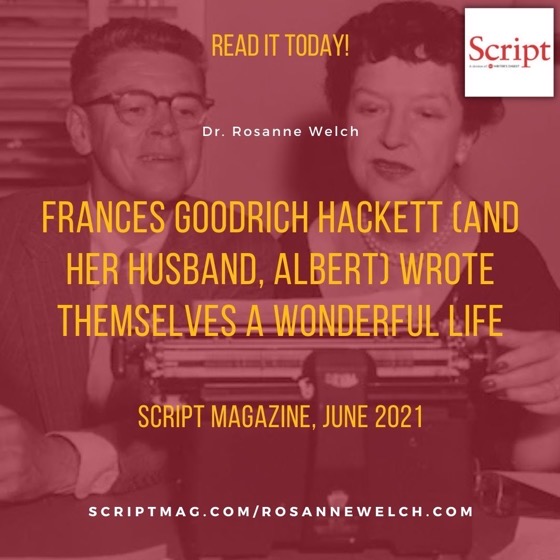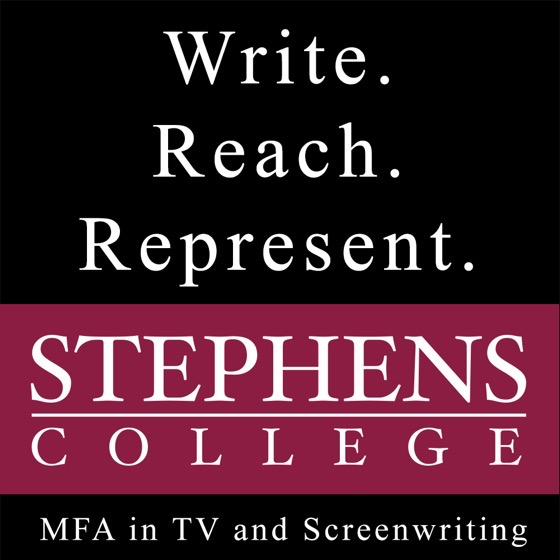
You have watched countless films written or adapted by Frances Goodrich Hackett. She has four Academy Award nominations for screenplays AND a Pulitzer Prize. Yet I bet you didn’t know her name until now. True to the title of one of her most enduring creations Frances had A Wonderful Life. Yep, she (and her writing partner and husband Albert Hackett) developed that beloved film from the bare bones of a postcard.
Though she was born in 1890, Goodrich found herself in an atypical family — one that accepted the idea of the theatre as a career — and she lived an atypical life for a woman of that era. Goodrich married three times (with the third to Albert being the charm that lasted over 50 years). When Goodrich showed an interest in the stage after her graduation from Vassar in 1912, her father arranged for her to join the Northampton Players stock company in Massachusetts. There her performances convinced her father that she should move to New York where she quickly earned bit parts on the Broadway stage.
Eventually, she started writing plays and asked a fellow actor, ten years her junior to read her script, give her notes, and help her on the rewrite. The play was Up Pops the Devil and the younger actor was Albert. When Metro-Goldwyn-Mayer studios offered the Hacketts a six-month writing contract at $750 per week in the midst of the Great Depression, they jumped on the steady money and made the move to Hollywood.
Like Wonderful Life the other stories the Hacketts brought to American films have made an indelible mark on our culture. They earned an Academy Award nomination for their adaption of the Edward Streeter novel Father of the Bride which became so entrenched in American memory it — and the sequel they also wrote– were remade in the 1990s for Steve Martin and Diane Keaton to headline (screenplay by then-also-married-screenwriting-couple Nancy Meyers & Charles Shyer). Few high school or college students graduate without once watching the film the Hacketts adapted from their own Broadway play, The Diary of Anne Frank (for which they earned a Pulitzer).
When Frances and Albert approached their first adaption – bringing The Thin Man (written by Dashiell Hammett) to the screen in 1934 — Nick and Nora Charles became synonymous with the emerging ideas of equality in modern marriage. Film studies have long held that the detective couple were patterned after Hammett and his companion, playwright Lillian Hellman. According to The Real Nick and Nora By Frances Goodrich & Albert Hackett, written by their nephew David L. Goodrich the relationship of Nick and Nora as it appears on film is in fact more closely connected to the relationship of the Hacketts.
Their marriage made their written work deeper and more sophisticated and whose shared work lives made the marriage stronger and more capable of lasting fifty-three years (ending only in Goodrich’s death in 1984.) In fact, as Nick and Nora are often referred to as the screen’s most beloved couple, Frances Goodrich Hackett and her husband Albert were often described as the “most beloved couple in Hollywood”.
Read Frances Goodrich Hackett (and Her Husband, Albert) Wrote Themselves a Wonderful Life on the Script web site
Read about more women from early Hollywood


![33 Terence Winter and Boardwalk Empire from There And Back Again: Writing and Developing for American TV [Video]](https://rosannewelch.com/wp-content/uploads/2021/07/rmw-oxford-brookes-33.jpg)
![32 Writer’s Room As Dinner Party from There And Back Again: Writing and Developing for American TV [Video]](https://rosannewelch.com/wp-content/uploads/2021/07/rmw-oxford-brookes-32.jpg)
![31 Drama is about making a choice from There And Back Again: Writing and Developing for American TV [Video]](https://rosannewelch.com/wp-content/uploads/2021/06/rmw-oxford-brookes-31.jpg)
![30 Safe…But Open from There And Back Again: Writing and Developing for American TV [Video]](https://rosannewelch.com/wp-content/uploads/2021/06/rmw-oxford-brookes-30.jpg)
![29 Write What (Emotions) You Know from There And Back Again: Writing and Developing for American TV [Video]](https://rosannewelch.com/wp-content/uploads/2021/06/rmw-oxford-brookes-29.jpg)


![28 Bruce Miller from There And Back Again: Writing and Developing for American TV [Video]](https://rosannewelch.com/wp-content/uploads/2021/06/rmw-oxford-brookes-28.jpg)
